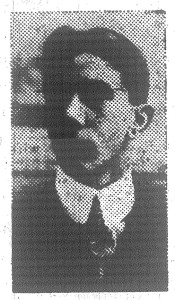BERWICK ADVERTISER, 14 MAY 1915
The Late Sergt. Jones, Berwick
We have received the following letter regarding the death of Sergeant Jones, teacher, St Mary’s School, Berwick who was killed in action:-
55, Meerbrook Road,
Hesley, Sheffield
(The Editor, “Berwick Advertiser.”)
In your report of the death of my nephew, Sergt. L. S. T. Jones, you state that his parents reside at South Shields.
May I ask you to correct this report. Sergt. Jones has had no parents since quite a child, and never did reside in South Shields, otherwise your description is accurate.
May I at the same time convey to the citizens of Berwick (and the numerous friends of the late Sergt. Jones, who have so greatly sympathised with us in this our sad bereavement), our heartfelt thanks for their consideration to us. It is indeed touching to know how he appears to have been appreciated by the Education Committee, the public bodies with which he has come in contact, and by the citizens generally.
Yours faithfully
J. Memmott
Hints for the Home
A very appetising way to use up all pieces of cold meat is to make a pie of the same, and in these days of high prices we must not waste a morsel. Take cold meet and mutton and slice it, lay these in a pie dish with onion etc, and seasoning. Also cover with gravy of stock, then cover with potatoes and bake in a hot oven until brown.
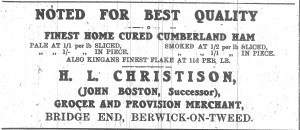
The first matter of importance when treating a scald or burn is to exclude the air from the wound, covering the burnt apart thickly with flower, and wrapping in cotton wool until medical air can be obtained.
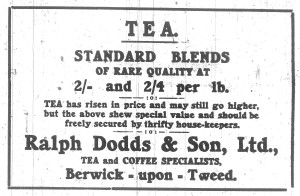
Capital portage labels can be made from old linen collars, which are usually thrown away. They are preferable to paper ones as they cannot be torn and can be cut to any size required.
To make a strong loop for heavy garment, take a thick piece of cord, and cover with kid. This will last as long as the garment.
Knitting needles in rubbed with a cinder will become bright like silver.
Interesting Letter from Engineer at the Front.
Tale of Terrible Fighting.
Private J. P. Smith, of the Royal Engineers, writes an intersting (sic) letter home to Mr Wm. McMillan, 45 Walkergate, Berwick. The letter, which is dated 6th May, states that it is a treat receiving letters from home, especially from people not young enough to take their proper place in this awful crisis. “Well, old man,” he proceeds, “I am in the best of health, although this business puts grey hairs on a fellows head. It is very busy times just now, as the (sic) are constantly at it day and night – no halt. A sudden move has taken place near Hill 60 again, and the Borderers, along with the West Kent
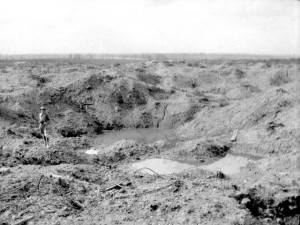
Regiment are about to distinguish themselves again. The 25th have lost a number of good officers and men, but still the vacancies are always filled and ready for action again. On account of the gases used by those unhuman beings you have read about, Poor fellows!, have to report sick with sore eyes. They are using these respirators now, which help to keep it down. But, oh! they are dirty dogs! And our fellows are always waiting for a chance – a fair fight, of which they don’t know the meaning. Well, our Brigade (13th) have been back for a few hours rest, only to be called on again. To look at some you forget you are at war. They are so cheerful. They might be “fed up,” but never show it. I was along with other two fellows of the Canadians on Tuesday night, and they gave me an illustration on the big fight, for those trenches the French lost. Well, what they said I won’t print. One said: “If that is worse than hell, well, I shall never go there.” The Germans are good fighters, but they had a big casualty list. However, it is the fortunes of war. I expect you saw the German casualty list – 12000 dead alone. Its not war; there is another name for it. However, he is going to be very lucky he who sticks it to the end, and I hope this will be in the near future for one and all. Talk about strikes! Put the people on strike in England in Tommy’s place at the front – what a difference! Well, I hope they have settled down again, as this affair is enough at a time. Well, Willie, news is very secret at present and scarce, so be satisfied with these few lines. Remember me kindly to Mrs McMillan; hope she is still well. I only hope I find my way back to Berwick soon. Well, write me again at your leisure. Good night!
“Behaviour Splendid and Magnificent.”
Local Officer’s Letter.
Captain H. R. Smail, 7th N.F., Berwick, writing from the front says:-
You will see our address is changed and we are evidently now to refit. We are at a farm, only a few hundred yards from the one I wrote from a week ago. Wish it was the same one but the people are nice here also. We were at an estimauet (sic) overnight. At 11 a.m. we had a visit from Sir John French and staff, including, we think, the Prince of Wales. The Field Marshall evidently thinks a lot of us. I append his address, which is almost in his exact words. He has a voice which carries beautifully. Here goes then – Northumberland Infantry Brigade, 4th, 5th, 6th, and 7th Northumberland Fusiliers. I am taking this opportunity to come among you to thank you for what you have done during the last ten days. Any unit, and especially a large unit like a division, arriving in this country expects and indeed is necessarily given some time to pull itself together. In the ordinary course of events you would have undergone this period on arrival at C—–l, but owing to the treacherous attack of the Germans which made a serious breach in our lines – a treacherous attack assisted by gas and other devices, the use of which no one worthy of the name of soldier would dream of employing, owing to that attack, I was saying I was forced to send you forward to reinforce the line around Ypres. For any brigade of regular troops your performance would have been wonderful for Territorial troops just landed in this country it is nothing short of SPLENDID AND MAGNIFICENT. I desire to express my appreciation of your work during the last ten days. The way you attacked and took St. Julien was
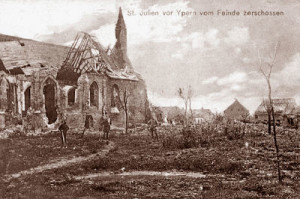
magnificent and though you had to retire at night you inflicted great loss on the enemy. Though you were bound to retire it was not your fault. You were not supported, why it is not for us to say. During this attack you lost your leader. Brigadier-General Riddell, whose death we all deplore. He was one of the most gallant officers that lived and I feel sure he could not have desired a more glorious death than to die leading his brigade. Your LOSSES ARE SERIOUS among the officers – nine killed and fifty three wounded, while among other ranks the losses are 50 killed and 700 wounded, also there are a great many missing, among which unfortunately there must be a large number killed. Looking all around this morning I admire your lines. From your appearance you might have been in bivouacs all this time, and you look as if you could take your place in the firing-line this afternoon if required. I have no doubt you will SHOW THE SAME GALLANTRY AGAIN if called upon. I always think when addressing Territorial troops of the splendid form of patriotism you have shown. You enlisted for home defence, but you have since taken upon yourselves the obligation of fighting abroad. Not like some others. I think the country appreciates more and more and day by day the sacrifice you are making.”…………..
This has, of course, bucked us up tremendously. I think we will be here for a week at least.


